Quitting
Some Career Transitions Take Longer Than Others
 Some career transitions take longer than others. Leaving a project management role at one company for another may be a matter of updating your LinkedIn profile, and making connections with recruiters, and performing well in interviews.
Some career transitions take longer than others. Leaving a project management role at one company for another may be a matter of updating your LinkedIn profile, and making connections with recruiters, and performing well in interviews.
Wholesale career changes might take longer. Not much longer if you’ve got transferable skills, are allied with an influential person at the place you want to work, launch your own enterprise or are just plain lucky.
It takes longer if your new career path requires going back to school for training or degrees, or means taking an entry-level job to gain experience in an unfamiliar field. But time is relative and two or three years of learning the ropes at a low-paying, low-stress, starter position might be the perfect transition between a job you hated and a new career that you’ll love for the rest of your working years.
I worked with a guy who transitioned from a six-figure sales job into a lower paid marketing role to build a career with more opportunities. He is savvy and worked hard, and six years later I bet he’s earning more than he did in sales and enjoying his life much better. Another friend moved from a lucrative engineering role to finance because it gives him the experience and credibility he needs for his next career move.
If you dream of a different career but are afraid that it will take too long or cost too much to get there, remember that you can start building the skills you need right now, before you quit. Take a night class. Volunteer in a related field. Go to events focused on your career topic and network. Ask people already in the roles you want to give you thirty minutes for an informational interview, where you ask them what skills and experience are needed to get started, what they actually do each day, and whether they like it or not.
I’ve done all of these things with great results. A series of informational interviews was how I learned early in my career that I wanted to focus on business, marketing and writing, and not on graphic design. I earned my MBA in five years of evening classes, and went to work each morning applying the knowledge I had just learned. I went to conferences and exchanged dozens of business cards with recruiters, executives and friendly people who I connected with. I’m still in touch with many of them.
If you’re still not convinced, read Jennifer Lesher’s blog post from May 20th, where she describes the transition from tech to airplanes. Can you feel her joy? Imagine yourself feeling the same way.
Regaining Confidence After a Bad Work Experience
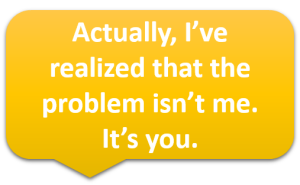 Bad jobs can hurt our souls. Humans thrive on contributing to things larger than ourselves, being productive, positive interactions with others and recognition for our efforts. A job is much more than a means to pay the bills.
Bad jobs can hurt our souls. Humans thrive on contributing to things larger than ourselves, being productive, positive interactions with others and recognition for our efforts. A job is much more than a means to pay the bills.
When a rotten manager tells you your work isn’t good enough – or you’re not good enough, it wounds your spirit. When coworkers blame and shame you, it rips little holes in your psyche. Even if you know that you add value to your company and that you do good work, even if you think your managers and their minions are idiots — constant negative feedback is damaging.
Many people who I’ve spoken with about quitting their jobs told me they lost confidence in themselves because of bad work experiences. These are people who have grown their careers, earned advanced degrees, or led initiatives that made millions of dollars for their companies. Some of them have tough reputations, and aren’t especially sensitive to criticism. Yet the negativity they endured made them unsure of themselves.
If you haven’t experienced a job like this and you’re not close to someone who has, you might be thinking, “If they were such great workers, why did their managers treat them so poorly?” Well, that is the reality of many organizations – whether military, education, corporate, religious or any other field — there is dysfunction. Often a team needs a scapegoat to blame for poor results, or to use as a target to vent their own insecurity and anger. Sometimes it is the company culture. Sometimes it is just crazy-making.
Feeling insecure about your value as an employee is not a great state to be in when searching for a new job. Interviewers can smell fear, and if you’re questioning your abilities, you may settle for a job you don’t want or accept a lower salary than you deserve.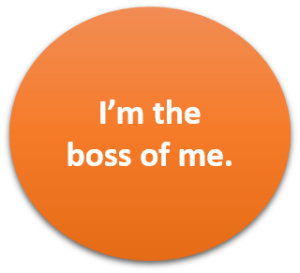
It took some people two or three years to regain their confidence and self-esteem after a terrible job, regardless of whether they were fired or quit on their own. Ugh. That is too long to let the jerks continue to have power over you. Fortunately, it doesn’t have to be this way. The people who bounced back quickly have this advice:
- Take back your power right now. Remind yourself as many times a day as you need to that this is your life. You get to choose whether you tell your coworkers “don’t talk to me like that” or quietly plot your exit while biting your tongue.
- You are more than your job. You are not your title, your company, or your salary. You are a whole person with many parts to your life. Know that your value as a human being is based on many things, but how your boss treats you is not one of them.
- You have skills and talents. When you feel low because you only hear what your manager thinks you are doing wrong, remember what you are good at. Write a list of your positive work traits if you need to. Take the Strength Finders test. Think of all you have accomplished in the past. When you’re scanning the job listings or updating your resume, this is the frame of mind to be in.
If you’ve left a horrible job or are currently in one, I hope you hold onto your self-worth and use what you’ve learned about the experience. You may come out on the other side with clearer boundaries, greater awareness of your strengths, and the confidence that comes from knowing that actually you are the boss of your own life.
Is Your Job Making You a Jerk?
Is Your Job Making You a Jerk? Here are a several signs of jerk behavior:
- Are you impatient with your coworkers and staff?
- Do you blurt out statements instead of thinking about how to phrase your communication in a way that will allow others to listen without getting defensive or hurt?
- Do you put a lot of effort into presenting yourself as if you are happier and calmer than you are?
- Do you frequently vent your frustration or complain to others?
If so, either you were already a jerk, or your job is not bringing out your best behavior. If you think that deep down you’re a nice person, or you used to be, there’s hope.
We’ve all heard the phrase “a toxic work environment.” Except instead of your bloodstream being poisoned by toxic chemicals in a non-OSHA approved factory, your soul is poisoned by absorbing too much negativity in the workplace. It might stem from a manager who rules by fear, or takes out his own fears on you. It might come from a team of colleagues who fill meeting rooms with hostility. Or there are office bullies and back-stabbers to contend with.
It might be that your official duties make no sense, you’re required to work so many hours that you’re constantly exhausted, or you’ve seen enough coworkers fired that you’re just waiting until the axe falls on you.
If you are surrounded by negativity you probably aren’t the friendly person everyone wants to eat lunch with in the cafeteria. It is draining to put effort into positive behavior when you are miserable at work. Over time, you lose your capacity to control it. You may be low on the scale that spans from “occasionally rude” to “a monster from hell”, but why be on the jerk scale at all if you can help it?
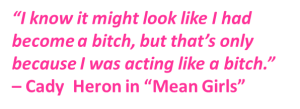 On the other hand, if you are non-stop cheerful despite working in a terrible environment, that is…not normal. You’ve either attained enlightenment or are detached from reality. Better to acknowledge the truth and then take action to change it.
On the other hand, if you are non-stop cheerful despite working in a terrible environment, that is…not normal. You’ve either attained enlightenment or are detached from reality. Better to acknowledge the truth and then take action to change it.
So what is the solution?
Quit.
Think about it: if you actually worked in a factory full of toxic chemicals, wouldn’t the best way to avoid poisoning your body be to stop exposing yourself to the toxins?
If you aren’t ready or willing to quit immediately, you can do a few things to protect yourself in the meantime. First, make a plan to quit! Save money, update your resume, network – you know the basics. Having a plan reminds yourself that you are empowered to make choices for your own life and that you are on a path leading to a better job.
Next, go ahead and vent – but only to one or two trusted coworkers who see the work environment the same way you do. Being able to tell someone about the crazy business decision that your boss just made will make you feel better, but only if your coworker gets why it is crazy and validates your frustration. Having a friend in the workplace who you can speak openly to without repercussions helps burn off that negative energy. It can also keep you from complaining to the wrong people – the people who are not on your side.
Finally, consider Dale Carnegie’s 30 principles from his book “How to Win Friends and Influence People”. All of the principles are useful to become a friendlier person and a more effective worker. My personal favorite is number 12: “If you are wrong, admit it quickly and emphatically.” When your jerk behavior gets the best of you, immediately apologize to the person you offended. Apologies show that you’re human, humble, and trying your best.
If your job is making you a jerk, know that it doesn’t have to be that way. You deserve a better workplace and a better attitude. Take steps to detox the negativity from your system. And be nice.
One More Thing Before I Quit
 When you’re planning to leave your job, there’s one more thing you may want to add to your checklist.
When you’re planning to leave your job, there’s one more thing you may want to add to your checklist.
Besides saving extra money, planning for your future healthcare, making sure you leave with all the compensation you’re entitled to, and all the other tasks like getting your personal data off of your company’s computer, writing a positive goodbye email, and so on, there’s one more thing.
But only you know what it is.
Whether you’re unhappy in your current job, or just ready to move on, there’s probably something you want to accomplish before you’re done there. It could be finally learning a new skill that you had been avoiding or completing a project that gives you credibility for your next role. It could be finishing a program or product that you’ve been immersed in, and want to see through to the end.
Maybe you’re finally ready to apologize to a colleague to resolve a mistake you made in the past. It could be standing up to a workplace bully to prove to yourself that you won’t accept that kind of behavior. Or, establishing boundaries with your manager to reclaim your sense of personal power.
You know what it is. Add it to your list. Go do it.
How You Quit Matters
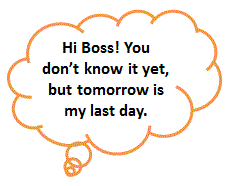 When leaving a job, we all know it is best to part on good terms. You know…don’t burn any bridges. HOW you quit will stay in people’s memories long after you’re gone.
When leaving a job, we all know it is best to part on good terms. You know…don’t burn any bridges. HOW you quit will stay in people’s memories long after you’re gone.
I recommend that people set an objective for how they want to quit and be clear why it benefits them.
For example:
- Leave with a solid reputation – because it provides source of positive referrals for future companies, or the possibility of returning to your former employer.
- Exit with all of the compensation you’re entitled to – because waiting until your stock or 401K vests, or for a bonus, provides money that you may need or help cushion you through a transition.
- Quit as soon as you’ve mastered a skill, or launched a successful program – because leaving while you’re confident and proud of your work is the ideal attitude to have while launching into your next phase.
Having an objective for the way that you want to leave your job gives you something to hold onto when you’re having a particularly bad day. It is a reminder of why you aren’t storming out of the office – you’re determined to quit on your terms.
I have to note, though, that I interviewed people who reached a breaking point at work and quit suddenly. After being yelled at in front of his coworkers, one customer service representative told his supervisor that, “I will no longer allow you to treat me this way. I quit.”
Another woman I spoke with was so miserable that she couldn’t take one more day of work. She went into work, got a few things from her office, and told her manager on the way out, “I’m quitting today.”
While it is prudent to leave on good terms, the people I spoke with had no problem finding other jobs. They had felt crushed by their old jobs and standing up for themselves was a way of taking their power back. It reminded them that in fact, nobody had the right to treat them abusively.
And then there’s Marina Shifrin, who became famous for her dance video resignation letter.
She Quit Her Teaching Job to Become a Coach, Author and…Teacher
 Many people take a winding path when they quit their jobs to do something more meaningful. I’ve written about my own journey that took a number of unexpected turns before I began my consulting business.
Many people take a winding path when they quit their jobs to do something more meaningful. I’ve written about my own journey that took a number of unexpected turns before I began my consulting business.
It might run in the family! My sister, Kristen Sutich, left her long-time job as a kindergarten teacher in the summer of 2013. She became a certified coach, starting a business that focuses on clients with grief issues and or parents of young school children.
Those areas might overlap – I know plenty of kids who give their parents grief!
While Kristen launched her coaching business, she wrote a book of tips for parents of children who are starting kindergarten. She knew that a published book would be useful in many ways: the hard copies are something tangible she can give to clients, authoring the book demonstrates her credibility as a subject-matter-expert, and it is one more way that she can reach prospective customers.
Then, just before publishing the book she decided to start teaching at a preschool near her. She was drawn to their creative approach, started as a substitute, and quickly became a staff member.
If you had asked her in July of 2013 if she thought she would be teaching preschool a year and a half later, she would have said no – she just quit her kindergarten teaching job!
Yet, by following her interests and building on her experience, Kristen now enjoys teaching preschool, giving book readings and growing her business by connecting with people who may need her coaching services. These three roles complement and add value to each other.
If you’re leaving your current employment soon or have recently started a new career path, keep an eye out for unexpected routes. Once you start putting your time and focus on what brings meaning and enjoyment to your life, you may discover opportunities that you wouldn’t have thought of before. Opportunities that lead you closer to your happiest career yet.
P.S. You can purchase The Kindergarten Toolkit for Parents on Amazon. It manages to be cute, interesting and helpful all at the same time.
How I Got From There to Here
When I first decided that I needed to leave my corporate job for my health and happiness, I didn’t know what else I would do for a living. It was the summer of 2012, and while recovering from a series of cold and flu’s, I read several of Martha Beck’s books. Most notably, Finding Your Way in a Wild New World, that I link to on my Resources page (I receive a small commission for items purchased through this link and appreciate them very much!). The book helped me broaden my thinking and to expect to discover little hints and nudges that would point me towards my next career.
I also did a series of mind mapping exercises. I took blank paper and markers and wrote words that described what I valued, what I enjoyed, and what I was good at. Then I drew lines to connect the words and phrases that had something in common with each other. What I discovered surprised me – I was very interested in ambiguous problems, and doggedly researching clues and analyzing my findings until I had a resolution. And then I liked to write up my results in a report. As I considered what I’d learned from Martha Beck’s books and looked at my mind maps, I thought the obvious conclusion was that I should be a detective. More specifically, a Private Investigator.
All the pieces lined up: I wanted to focus deeply on finding the truth and the details in missing persons cases, skip-tracing people who failed to show up for court dates, and run background checks. The results of which I could package into neatly organized reports for my clients.
I was so certain that this was my next career move that I got certified to work as a PI, wrote a business plan, took a human footprint tracking course, and registered a domain name for my future investigation business: Truth and Details.
As I completed more and more of the items in my plan to quit my job, I decided that immediately after quitting I would spend a month in writing classes at Boulder’s Jack Kerouac School of Disembodied Poetics before launching my PI business. Then in the weeks before heading out to Colorado, a former colleague and I decided to start a real estate investment company that would democratize the way people invested in rental properties.
Suddenly, the PI business was on hold: I could start that at any time. I wanted to immerse myself in writing for a month and then when I got home, to bring this new business idea to life. The writing classes were great. The real estate business didn’t take off. I still believe in the concept, but it would have been a risky, long-term investment and I needed income.
So I turned to consulting, which I always thought of as a backup plan. It turns out that I love consulting, and use many of the skills that attracted me to investigation work. I like to unravel clients’ problems, analyze data, formulate solutions, and wrap everything up in a tidy report-out of results.
I did not transition into the business I planned on in 2012, but taking those steps gave me the confidence and preparation I needed to get to where I am now: in a satisfying career that aligns with my interests and skills. It is interesting that my company name and values remained the same: providing clients the truth and details they need to achieve their objectives.
What we do for money
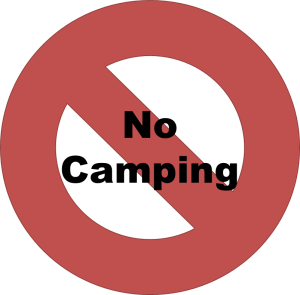 I was talking to a friend the other day about how people believe they are limited in their career choices because of money. We both know many people in well-paid professions who aren’t happy with their jobs. They work exhausting hours or feel like their skills are being wasted, or they can’t stand their work environment. The options they consider include finding a similar job elsewhere or toughing it out and hoping things improve.
I was talking to a friend the other day about how people believe they are limited in their career choices because of money. We both know many people in well-paid professions who aren’t happy with their jobs. They work exhausting hours or feel like their skills are being wasted, or they can’t stand their work environment. The options they consider include finding a similar job elsewhere or toughing it out and hoping things improve.
There are more options, of course, but many people eliminate the ones that involve scaling down their lifestyles unless they are forced to. Expensive houses can be sold to live in smaller, more affordable homes. Luxury cars can be traded in for economical models. Resort vacations can be replaced by… camping. I’m laughing as I write this – I’m not much of a camper. But you know what I mean.
The point is, if you hate your job but love your paycheck, is it worth it? There’s no judgment if the answer is yes. It’s great to have money to spend on things that we enjoy and different people have different priorities.
I’m glad I got to experience some incredible vacations in the past, and my biggest expense is still my mortgage. But I spend less and save more in order to have the career that I want. And I wouldn’t trade it for a bigger house or a Mercedes or an annual trip to the Four Seasons Hualalai.
You really can go after what you want in life and get it
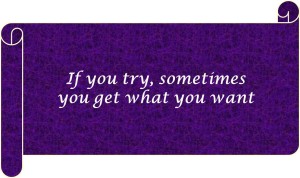 This evening as I was leaving my client’s office, I ran into a friend that I hadn’t seen for a few years. She asked how my life has been since I quit my job in the summer of 2013. I gave her the highlights of going to the Jack Kerouac School for a month of writing classes, starting a business that didn’t work out and then doing consulting work and realizing I love it.
This evening as I was leaving my client’s office, I ran into a friend that I hadn’t seen for a few years. She asked how my life has been since I quit my job in the summer of 2013. I gave her the highlights of going to the Jack Kerouac School for a month of writing classes, starting a business that didn’t work out and then doing consulting work and realizing I love it.
She expressed how glad she was that my career has gone well for me in the last year and a half and I was touched that she was happy for me. She said something else, though, that made a big impression. She said, “You are proof that people really can go after what they want in life and get it.”
My career isn’t perfect. Finding great clients can take time and be nerve wracking. Running my own business comes with a whole set of accounting tasks, licensing and taxes that I didn’t have to deal with when I was a full time employee.
And yet.
I went after what I wanted in my work life and got it. More flexibility and autonomy. Less bureaucracy. More enjoyment of my day-to-day work life. Less stress. More opportunities to use my skills set and keep learning.
You really can go after what you want in life and get it.
What I Learned About Business from Improv Acting Class
 A few months after I quit my corporate job, I signed up for an eight-week improv acting class. We met for two and half hours on Wednesday evenings at a community center where we practiced improv techniques. I realized that much of what we learned applies to business.
A few months after I quit my corporate job, I signed up for an eight-week improv acting class. We met for two and half hours on Wednesday evenings at a community center where we practiced improv techniques. I realized that much of what we learned applies to business.
Three improv lessons are especially useful:
- Yes, and
- Commit
- Know When to Exit
Yes, and
In improv, this means you go with the direction your improv partner has started in order to keep the scene going. Cooperating and adding to the foundation that your partner set is what builds the story line and keeps the momentum going.
In business, if you were taught best practices in brainstorming sessions, you have already learned this. What it means is that when someone makes a suggestion, you say “yes” and then add your idea about how to make it even better. That way, whether you think their idea has merit or not, you’re keeping the positive flow of ideas coming and contributing in a positive way.
Commit
 In improv, once you enter the scene as a space alien coming to kidnap Santa Claus, you talk and act like a space alien on a mission to get Santa. If you get embarrassed and limp through your scene, it isn’t going to be enjoyable for you or the audience. If you decide you don’t want to be a space alien and try to change to something else, then you’re screwing up the scene for your partner who is playing Santa.
In improv, once you enter the scene as a space alien coming to kidnap Santa Claus, you talk and act like a space alien on a mission to get Santa. If you get embarrassed and limp through your scene, it isn’t going to be enjoyable for you or the audience. If you decide you don’t want to be a space alien and try to change to something else, then you’re screwing up the scene for your partner who is playing Santa.
In business, this boils down to deciding what your objective is, how you are going to execute upon it and then doing it. Being unclear about your objective confuses the people who need to take action. Changing tactics midway through projects wastes time and money.
Know When to Exit
In improv, sometimes an actor says a great line that is a perfect finish to the scene. The audience laughs and everyone recognizes that it’s complete. That is the time to exit and let the next scene begin fresh. Any added words or actions after that point dilutes the powerful impact that was made and it becomes less funny.
Another time to exit the scene in improv is if the scene isn’t going anywhere, it is dragging on, and the players can’t seem to fix it. The best thing to do in that case is wrap it up and move on to the next scene.
In business, there are many great applications to this lesson. You’ve won the client’s business: now shake hands and get out of their office. You’ve agreed upon next steps in the meeting: close up the laptops and get back to work. You had a great success with a product promotion that has now ended: take the lessons learned and move onto the next promotion.
And in the case of the project not going anywhere…knowing when a product or program is not viable is much more valuable than trying to force it to happen. Accept the sunk costs and move on.
This can also be applied to a job. When it becomes clear that your job is not going the way you need it to, making the decision to exit could be the best way for you to bring the scene to a close on your own terms.

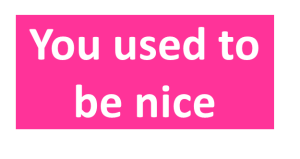

Recent Comments